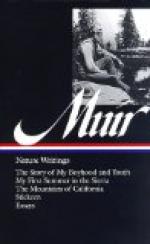We even enjoyed the snowstorms, the thronging crystals, like daisies, coming down separate and distinct, were very different from the tufted flakes we enjoyed so much in Scotland, when we ran into the midst of the slow-falling feathery throng shouting with enthusiasm: “Jennie’s plucking her doos! Jennie’s plucking her doos (doves)!”
Nature has many ways of thinning and pruning and trimming her forests,—lightning-strokes, heavy snow, and storm-winds to shatter and blow down whole trees here and there or break off branches as required. The results of these methods I have observed in different forests, but only once have I seen pruning by rain. The rain froze on the trees as it fell and grew so thick and heavy that many of them lost a third or more of their branches. The view of the woods after the storm had passed and the sun shone forth was something never to be forgotten. Every twig and branch and rugged trunk was encased in pure crystal ice, and each oak and hickory and willow became a fairy crystal palace. Such dazzling brilliance, such effects of white light and irised light glowing and flashing I had never seen before, nor have I since. This sudden change of the leafless woods to glowing silver was, like the great aurora, spoken of for years, and is one of the most beautiful of the many pictures that enriches my life. And besides the great shows there were thousands of others even in the coldest weather manifesting the utmost fineness and tenderness of beauty and affording noble compensation for hardship and pain.
One of the most striking of the winter sounds was the loud roaring and rumbling of the ice on our lake, from its shrinking and expanding with the changes of the weather. The fishermen who were catching pickerel said that they had no luck when this roaring was going on above the fish. I remember how frightened we boys were when on one of our New Year holidays we were taking a walk on the ice and heard for the first time the sudden rumbling roar beneath our feet and running on ahead of us, creaking and whooping as if all the ice eighteen or twenty inches thick was breaking.
In the neighborhood of our Wisconsin farm there were extensive swamps consisting in great part of a thick sod of very tough carex roots covering thin, watery lakes of mud. They originated in glacier lakes that were gradually overgrown. This sod was so tough that oxen with loaded wagons could be driven over it without cutting down through it, although it was afloat. The carpenters who came to build our frame house, noticing how the sedges sunk beneath their feet, said that if they should break through, they would probably be well on their way to California before touching bottom. On the contrary, all these lake-basins are shallow as compared with their width. When we went into the Wisconsin woods there was not a single wheel-track or cattle-track. The only man-made road was an Indian trail along the Fox River between Portage and Packwauckee Lake. Of course the deer, foxes, badgers, coons, skunks, and even the squirrels had well-beaten tracks from their dens and hiding-places in thickets, hollow trees, and the ground, but they did not reach far, and but little noise was made by the soft-footed travelers in passing over them, only a slight rustling and swishing among fallen leaves and grass.




